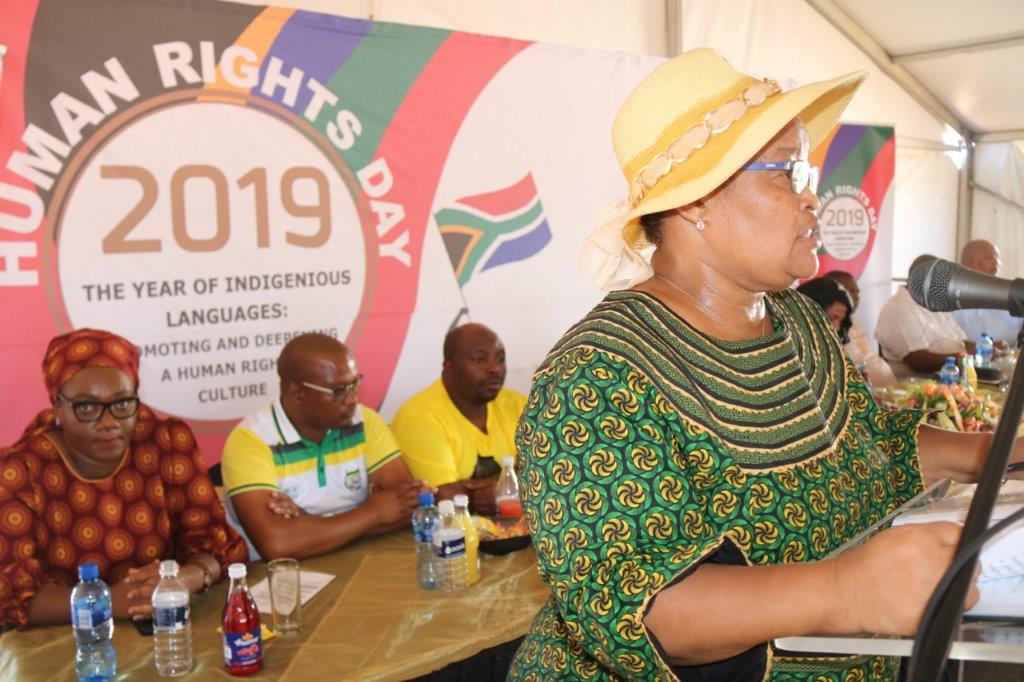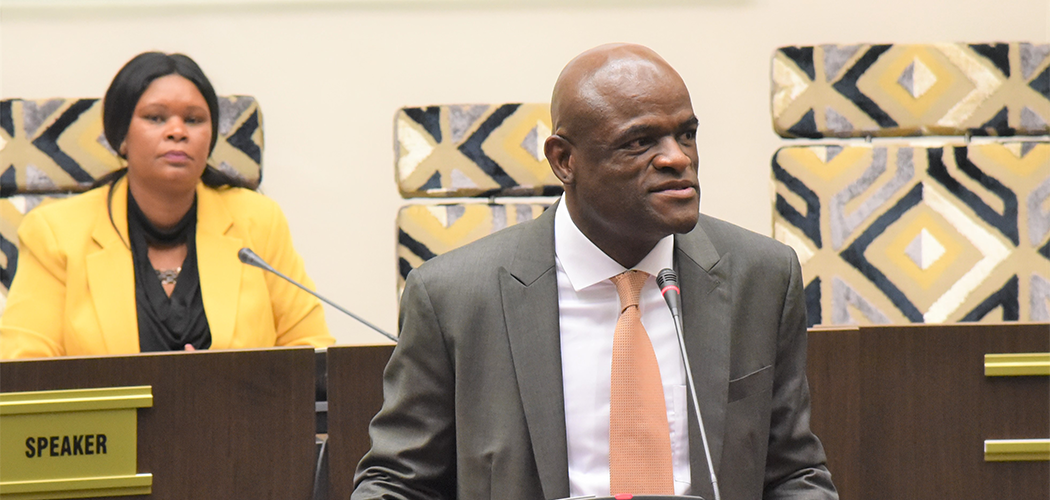- Hits: 5519
Address by the Premier of the Northern Cape, Ms. Sylvia Lucas, at the commemoration of Human Rights Day Reitlamile Intermediate School, Pampierstad
 Programme Director
Programme Director
Honourable Members of the Executive Council
Honourable Members of the Provincial Legislature
Executive Mayors and Councilors
Government officials,
Community of Phokwane
Members of the media
Ladies and gentlemen
Today is a celebration of what we as a country have achieved thus far as well as a sad reminder of those who sacrificed their lives so that we can be free. This day has been singled out for us as South Africans to remind us of our transition from an apartheid state to a constitutional democracy that is based on the values of human dignity, the achievement of equality, human rights and freedoms, as well as non-racialism and non-sexism.
These rights and corresponding freedoms that we sometimes take for granted did not come easy. This was achieved through a long struggle of resistance against an unjust and inhumane system called apartheid. The National Human Rights Day in South Africa is associated with the 21st of March 1960; on that day peaceful marchers were mercilessly massacred by the apartheid regime. On this day an anti-pass march to the Sharpeville police station in Vereeniging came to a brutal end with the mass killing of peaceful protesters. The Sharpeville massacre as the event became known, signaled the start of armed resistance in South Africa and prompted worldwide condemnation of South Africa’s apartheid policies.
Baie van ons wat hier teenwoordig is, kan met hartseer onthou hoe vernederend dit was om ‘n dompas te dra wat jy oral moes wys. Ons vryheid tot beweging en assosiasie is ten sterkste ingeperk. Ons hele geskiedenis was vervat in hierdie dompas. Om soos derde klas burgerlikes behandel te word het mense genoodsaak om in teenstand van hierdie dompas stelsel te staan. Die gevolg was dat hierdie mense, wat elk ‘n held en vryheidsvegter in eie reg is, opgeruk het na die polisie kantoor in Sharpeville om hul teenstand teen die dra van en die bestaan van die dompas te wys.
Wat hierna gevolg het, sal altyd ‘n klad op ons geskiedenis wees. Dit is ‘n gebeurtenis waaroor die vorige regering vir altyd hul koppe in skaamte sal sak. Op daardie dag het ses en neentig mense, vaders, moeders en kinders wat vreedsaam protesteer het, hul lewens in ‘n oogwink verloor. Nooit, maar nooit sal ons dit vergeet nie.
Ladies and gentlemen, these innocent protesters were merely demanding their human rights in the country of their birth. The Sharpville massacre mobilized the international community to take action against the apartheid government. The massacre laid bare not only the cruel and barbaric aspect of apartheid but the clear systematic violation of human rights of the majority of African people in South Africa. Soon after this day the United Nations declared Apartheid an act against Humanity.
This democratic government declared 21 March as Human Rights Day in South Africa. The entire month of March is commemorated as Human Rights Month in order to remind us about the sacrifices that accompanied the struggle for liberation and also to celebrate the achievement of democracy in South Africa.
The renaming of Sharpeville day was in line with the imperatives of a new and democratic government as espoused by our Constitution and in particular the Bill of Rights. The value addition of this day to all South Africans is to emphasize the ANC Government’s commitment in ensuring that every person who resides in South Africa enjoys equal rights.
There is no doubt, that significant gains have been made in the promotion, development and protection of human rights since the advent of our democracy, we however still have to do more to ensure that human dignity, equality and freedom is permanently entrenched in the lives of our people.
Ladies and gentlemen, this year’s celebration of the triumph of the human spirit against an unjust system coincides with the United Nations’ International Year of Indigenous Languages. On 19 December 2018 the UN General Assembly took a resolution to adopt 2019 as the International Year of Indigenous Languages. For this reason we are commemorating Human Rights day under the theme “The Year of Indigenous Languages: Promoting and Deepening A Human Rights Culture”. The aim is to draw attention to the critical loss of indigenous languages and the urgent need to preserve, revitalize and promote indigenous languages and to take further urgent steps at the national and international levels.
Ladies and gentlemen, this ANC led government is truly a government that cares for its entire people regardless of race, diversity, heritage, culture, religious conviction, and especially language. The Northern Cape is also a province rich in history, culture and heritage. As this ANC government we strongly believe in the recognition of the identity principle. We recognize that it is precisely our diversity that makes us as South Africans unique. Within this context we strive towards the protection and promotion of all cultures, languages, traditions and history. Working together with our communities, we have been able to make substantial improvements in access to sport, arts and culture.
Strengthening and protection of the indigenous languages of our Province has been an area in which the Department of Education has played an active role in empowering especially the communities of Platfontein and the Namakwa region in the development of these languages. Therefore as early as 2000, Nama was introduced as a subject in these towns. This was done in order to preserve the Nama language. By working with our neighbors Namibia, we have seen education enhancement through the development of indigenous languages such as !Nxu, Nama and !Khwe. We will continue to work with the Department of Basic Education, development partners, PANSALB and various other stakeholders such as NGO’S, to enhance not only the Nama language but also to see how other indigenous languages can be included in our schooling curriculum. We all have a duty to promote, support and protect indigenous languages. In doing so, we will promote a culture of human rights and mutual respect for one another. We should always be mindful of the fact, that it is every citizen’s right to use their language and to celebrate their culture.
Ladies and gentlemen, today is also a day to take stock of the road that our country has traversed over the past 25 years.
Dames en here, daar is geen kwessie daaraan dat ons land 'n lang pad kom. Ons kom uit 'n era waar jou vel pigmentasie of kleur die kwaliteit van jou lewe bepaal het. Ons kom uit 'n era waar 'n mens se vel kleur bepaal het met wie jy mag vriende wees, waar jou vel kleur selfs bepaal het waar jy mag woon en selfs jou lot bepaal het. Hierdie is als die wrede waarheid van ons verlede en daarom moet ons met verantwoordelikheid hierdie vryheid van ons bewaar.
This year as we mark Human Rights Day, twenty three years after signing our democratic Constitution; we should indeed celebrate what we have achieved since then. Today more people have access to housing, water, sanitation and electricity. Health services are more accessible and South Africa today has the biggest anti-retroviral treatment programme in the world with over 3.2 million people on treatment last year. The mother-to-child-transmission declined from 8.5% in 2008 to 1.5% in 2015. Think of all the thousands of babies that were protected from HIV infection. The number of learners that have passed matric increased from 50% before 1994 to around 78% today. Access to free basic education and higher education has been expanded to children from poor households. Government’s school nutrition to primary and secondary school children reaches millions of children in the country every day and helps to increase productivity and concentration. Social grants have increased steadily and are known to reduce poverty. I mention these, not only to show that we are a government in touch with the realities of the poor but also to acknowledge that much has been done and yes more can be done through a renewed contract. What cannot be denied is that the delivery of free basic services over the past few years, has led to an increase in a quality of life and access to economic opportunities. These efforts are also a testimony that government has made significant progress in redressing the inequalities of the past and the advancements of human rights as enshrined by the Constitution.
Ladies and Gentlemen, as government we wish to call on everyone to use the Human Rights month as a vehicle to foster social cohesion, nation building, national identity, socio-economic development and to combat racism, racial discrimination, xenophobia and all related intolerances. Let us highlight the progress made in advancing human rights and restoring human dignity. Let us continue to promote unity in diversity among all sectors of the South African society and create awareness through educational programmes, dialogues and public engagements on the importance of Human Rights.
Laat hierdie dag nie net nog 'n openbare vakansiedag is nie, maar in plaas daarvan laat ons stilstaan en besin oor hoe ver ons gekom het, wat meer moet gedoen word en hoe dit bereik kan word deur middel van algemene waardigheid en respek vir die regte van almal.
I want to conclude by stating that; as we head for the polling stations to exercise our democratic right, a right that many others lost their lives for, to cast our vote on the 8th of May 2019, we will also be celebrating the 23rd anniversary of the adoption of the South African Constitution on 8 May 1996. It’s important to note that the preamble to the South African Constitution echoed the Freedom Charter, namely:
“We, the people of South Africa, Recognise the injustices of our past; Honour those who suffered for justice and freedom in our land; Respect those who have worked to build and develop our country; and believe that South Africa belongs to all who live in it, united in our diversity.”
Let us continue to work together to protect the human rights and dignity of all South Africans and move our beautiful country forward.
I thank you




 Frances Baard District Municipality, Kimberley
Frances Baard District Municipality, Kimberley Programme Director
Programme Director